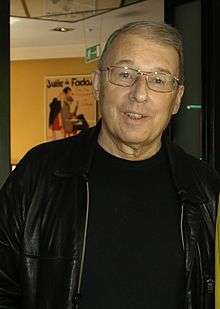Ryszard Bugajski
Ryszard Bugajski (27 April 1943 – 7 June 2019)[1] was a Polish film director and screenwriter. He directed 23 films and television shows since 1972. His 1982 film Interrogation starring Krystyna Janda and Adam Ferency, described as "the most anti-Communist film in the history of Polish People's Republic"[2] was entered into the 1990 Cannes Film Festival after being suppressed by the Polish communist authorities for several years.[3][4]
Ryszard Bugajski | |
|---|---|
 | |
| Born | 27 April 1943 |
| Died | 7 June 2019 (aged 76) Warsaw, Poland |
| Education | National Film School in Łódź |
| Occupation | Film director, screenwriter |
| Years active | 1972–2019 |
| Spouse(s) | Maria Mamona |
Life and career
He was born on 27 April 1943 in German-occupied Poland. His father was Edward Bugajski, a member of the pre-war Polish Socialist Party (PPS). He studied philosophy at the University of Warsaw and directing at the National Film School in Łódź, which he graduated from in 1973.[5]
In 1976, he joined the X Film Unit managed by Andrzej Wajda, where he directed the films A Woman and a Woman and Classes. In 1981, he made the full-length feature film Interrogation, which was banned by the communist censorship because of the film's message being incompatible with the political line of the Polish authorities after the imposition of martial law. As a result of this, the X Unit was officially dissolved.[6] In 1985, Bugajski decided to emigrate to Canada where he became a director of popular television series.[7] The official premiere of Interrogation took place in December 1989, after the collapse of communism in Poland.
He was a recipient of numerous film awards including the Golden Grape Award, Special Award at the Gdynia Film Festival and Silver Hugo Award at the Chicago International Film Festival.
In June 2008, he was awarded the Officer's Cross of the Order of Polonia Restituta for "his outstanding contributions to the democratic transformations in Poland as well as for achievements for the country in his professional and social work".[8]
In October 2008, he received the Golden Medal for Merit to Culture - Gloria Artis from the-then Minister of Culture and National Heritage Bogdan Zdrojewski.[9]
He died on 7 June 2019 in Warsaw after a long illness.[10][11]
Selected filmography
- Kobieta i kobieta (1979)
- Interrogation (1982)
- Clearcut (1990)
- Gracze (1995)
- The Death of Captain Pilecki (2006)
- Generał Nil (2009)
- Układ zamknięty (2013)
- Blindness (2016)
See also
- Cinema of Poland
- List of Poles
References
- Ryszard Bugajski nie żyje. Reżyser, scenarzysta i pisarz zmarł w wieku 76 lat
- "Nie żyje Ryszard Bugajski. Twórca "Przesłuchania" miał 76 lat". Retrieved 9 June 2019.
- "Festival de Cannes: Interrogation". festival-cannes.com. Retrieved 5 August 2009.
- "Death and Rebirth: Revisiting Ryszard Bugajski's Masterpiece Interrogation (Poland, 1982)". Retrieved 8 June 2019.
- "Ryszard Bugajski". Retrieved 8 June 2019.
- "Renowned film director Ryszard Bugajski dies aged 76". Retrieved 9 June 2019.
- "Renowned film director Ryszard Bugajski dies aged 76". Retrieved 9 June 2019.
- "Ryszard Bugajski". Retrieved 8 June 2019.
- "Ryszard Bugajski". Retrieved 8 June 2019.
- "Renowned film director Ryszard Bugajski dies aged 76". Retrieved 9 June 2019.
- "Nie żyje Ryszard Bugajski. Twórca "Przesłuchania" miał 76 lat". Retrieved 8 June 2019.
External links
- Ryszard Bugajski on IMDb
- Ryszard Bugajski at Culture.pl